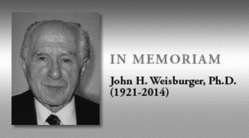
John Weisburger, born September 15, 1921, in Stuttgart, Germany, was one of the leaders in the study of diet and cancer causation. He passed away February 17, 2014 at the age of 92, after a short illness. An immigrant to the United States of America, he served in in the US Army during World War II. He received his doctorate at the University of Cincinnati, Ohio in 1949 and became a U.S. Public Health Service Research Fellow with the National Cancer Institute (NCI) in 1950. From 1961 to 1972 at the NCI, together with his then wife, Dr. Elizabeth Weisburger, his research focused on chemical carcinogen metabolism and molecular effects of carcinogens.
In 1969, when I joined his laboratory at the National Cancer Institute, John's interest was turning to diet and cancer. Several experiments were underway to examine the influence of dietary fiber on experimental colon carcinogenesis. This period of two years in John's laboratory was my introduction to chemical carcinogenesis and as a result of his mentorship and encouragement, I stayed with the field for my entire career. Through John's interest in nutrition studies he came into contact with Ernst Wynder, a pioneer in tobacco carcinogenesis, who at that time was establishing the American Health Foundation (AHF) as a multidisciplinary research center to study environmental causes of cancer and nutritional approaches to cancer prevention. The American Health Foundation evolved into the first NCI-sponsored Cancer Center devoted solely to cancer prevention. Ernst Wynder recruited John to the AHF in 1972 as Vice President for Research. At that time, Dietrich Hoffmann and his colleague, Steve Hecht, were leading a research program on tobacco carcinogenesis while Bandaru Reddy and Leonard Cohen were pursuing the role of diet and nutrition in the causation of colon and breast cancer. Using leads from international cancer epidemiology, implying a dietary causation, John implemented experimental studies on the role of diet in stomach cancer, focusing on heterocyclic amines in cooked foods. I was fortunate to participate in these studies after rejoining John from Temple University in 1975. Later, John initiated research on green tea as a chemopreventive agent. John assiduously adhered to the dietary recommendations evolving from his and other research in the field. During his time at the American Health Foundation he also served as Research Professor of Pathology at New York Medical College, in Valhalla, NY.
John was a concerned mentor to me and the many younger scientists at the American Health Foundation and New York Medical College, whom he encouraged in every way. He went out of his way to invite scientists from outside the USA to work at the AHF. He is survived by his wife Helga, 5 children, 13 grandchildren, and 2 great grandchildren. He is greatly missed by his numerous colleagues, and fondly remembered.
Gary Williams
New York Medical College
